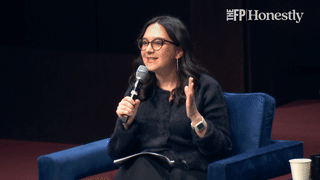Simon Sebag Montefiore: History Is Not Over ‘We’re coming out of what I would call the 75-year peace,’ argues the historian. ‘There’s never been a period like this in world history.’
Did you know that Joseph Stalin could sing with perfect pitch? Or that he was so scared of his wife that he would hide from her in the bathroom? Did you know that Peter the Great liked to surround himself with naked dwarfs? Did you know that Catherine the Great—long smeared as a nymphomaniac—was actually a lovelorn monogamist? Or that King Herod’s genitals once exploded with maggots? Most historians bore you with dry accounts of battles and treaties, and it’s hard to remember any of it. But not Simon Sebag Montefiore, who writes 900 pages that you cannot put down. Sebag Montefiore is one of the most important historians alive today. His many books, like Stalin: The Court of the Red Tsar, The Romanovs, and Catherine the Great & Potemkin are essential to understanding power, politics, revolution, dictatorships, and above all, human nature. While most of Sebag Montefiore’s books are biographies of people, Jerusalem is a biography of a city—one that is “the house of the one God, the capital of two peoples, the temple of three religions, and she is the only city to exist twice—in heaven and on earth.” The book takes you through 3,000 years of Jerusalem’s history, from King David to Benjamin “Bibi” Netanyahu. It is a must-read. It has sold more than a million copies, and it has just been reissued in paperback. With the ceasefire deal underway in Israel and with Donald Trump a few weeks into his second presidency, we could not think of a better person to talk to at this moment. Click below to listen to our conversation on Honestly, recorded live in New York City last week. You can also watch the video above, or scroll down for an edited transcript.
On the crisis of confidence in the West: Bari Weiss: A lot of us grew up under the belief that history had ended, that liberalism and capitalism were obviously better than any other system and would conquer the world. That now seems so naive. How did we get that so wrong? Simon Sebag Montefiore: I think what we’re coming out of is an extraordinary period. We’re coming out of what I would call the 75-year peace. But in 1945, when Nazi Germany was vanquished, there was such a shock that all sorts of things became clear. All sorts of taboos were established—antisemitism, for example. But it also became self-evident that Western liberal democracy was the freest, the most open society in which to live, and the values that that engendered brought us great advances in world affairs: the rules-based world order, supranational organization, the United Nations, the idea of world human rights. And then in the 1960s, what I call the “Great Liberal Reformation” of gay rights, abortion, the pill, all these sorts of things. None of that was challenged by anyone for a very long time. So America could go about its mission of selling those ideas to the world. And then, of course, the Soviet Union fell. But it’s interesting to realize that there’s never been a period like this in world history. This wasn’t normal. Normally, everybody is against everybody. Most world history is about a multiplayer game, but the Cold War was a game of chess between two great players: the Soviet Union and the U.S. And when that ended, America lost its way...
Become a paid subscriber Get access to our comments section, special columns like TGIF and Things Worth Remembering, tickets in advance to our live events, and more. UPGRADE TODAY |


